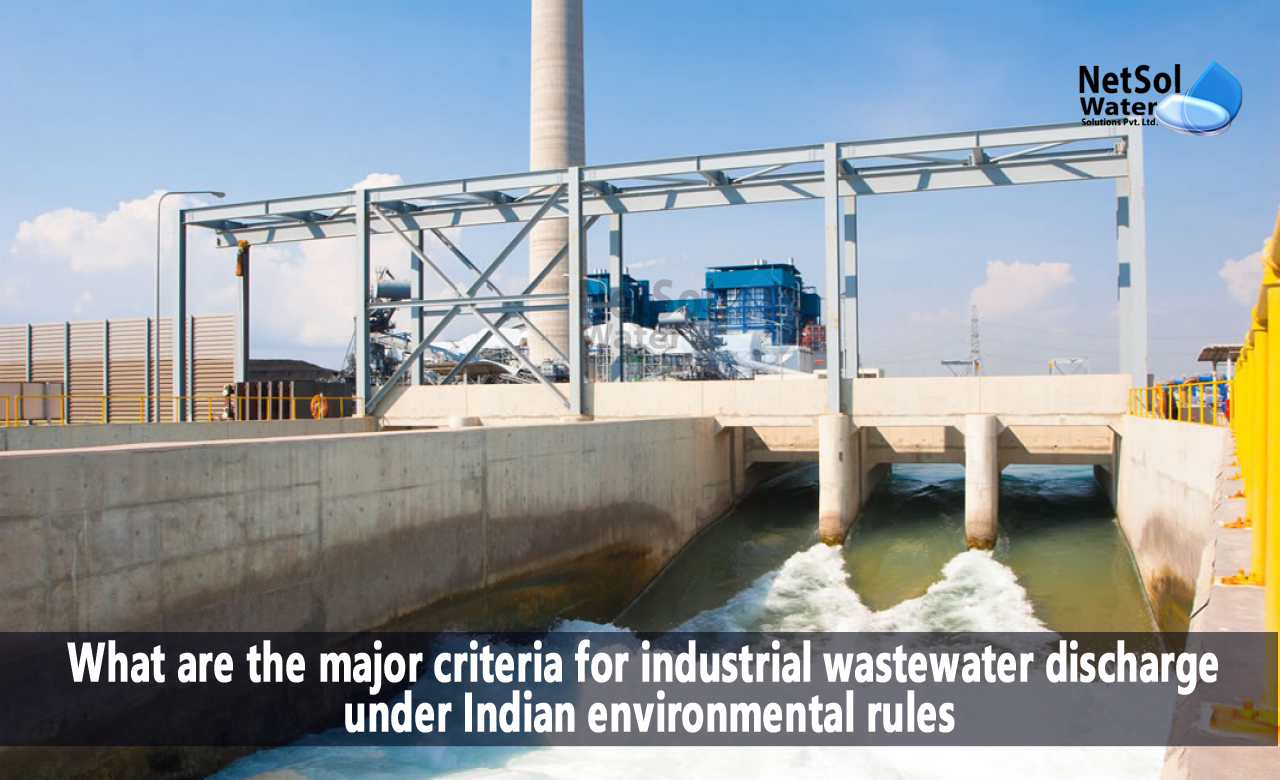Rules for industrial wastewater discharge under Indian environmental
Strict laws and policies that safeguard the environment, public health, and water resources apply to the discharge of industrial wastewater into the Indian ecosystem. Under Indian environmental regulations, the primary factors dictating the disposal of industrial effluent encompass:
· Consent to Establish and Operate
In compliance with the Water (Prevention and Control of Pollution) Act, 1974, and the Air (Prevention and Control of Pollution) Act, 1981, an industrial unit must first obtain consent to establish and operate from the State Pollution Control Board (SPCB) or the Pollution Control Committee (PCC) before it can discharge wastewater. This approval guarantees that the industrial facility conforms to all applicable environmental regulations.
· Effluent Standards
Specific effluent standards that industrial units must follow have been established by the Central Pollution Control Board (CPCB) and SPCBs/PCCs. Maximum allowable concentrations of different pollutants in industrial effluents are specified by these standards. These include parameters like pH, total suspended solids (TSS), chemical and biological oxygen demand (COD), biological oxygen demand (BOD), and specific pollutants like heavy metals, oil and grease, and toxic substances. Industries are required to keep their effluent quality within these specified bounds and to regularly check it.
· Zero Liquid Discharge (ZLD)
The Indian regulatory framework has placed a strong emphasis on the use of ZLD systems for a number of sectors, especially those that operate in water-scarce locations, in recent years. ZLD seeks to recover and recycle as much of the wastewater as possible, releasing little liquid. ZLD systems are mandated for several companies in order to reduce their water and environmental impact.
· Recycle and Reuse
Wherever possible, regulations urge industrial facilities to put systems in place for the treatment and reuse of their effluent. This lowers the total amount of wastewater released into the environment while simultaneously conserving water resources.
· Regulations Specific to Location
Depending on where the industrial unit is located, different wastewater discharge requirements may apply. Wetlands, riverbanks, and eco-sensitive zones are examples of areas with ecological significance that might have more stringent discharge regulations.
· Environmental Impact Assessment (EIA)
To assess the possible environmental effects of their operations, large-scale industrial projects frequently need to conduct an EIA. Evaluating the effect of wastewater discharge on the surrounding environment and ecosystem is one aspect of the assessment.
· Renewal of Consent
Industrial units usually have their consent to operate given for a certain amount of time, after which they must request to have it renewed. ZLD requirements, effluent standards, and other conditions set forth by the regulatory bodies must be followed in order for the renewal to proceed.
· Self-Monitoring and Reporting
Industries are required toestablish self-monitoring systems to continuously measure and report their wastewater quality parameters. This involves routinely sampling and analysing wastewater to make sure it complies with the established guidelines. Reports on compliance have to be delivered to the appropriate authorities.
· Hazardous Waste Management
The Hazardous and Other Wastes (Management and Transboundary Movement) Rules, 2016 impose strict rules on industries producing hazardous waste. These regulations mandate the proper handling and disposal of hazardous waste along with measures to get environmental permits.
· Environmental Audit
To evaluate the overall environmental performance of industrial units, regulatory agencies or accredited auditors undertake regular environmental audits. This involves assessing how wastewater discharge affects the community's environment and general health.
· Public Health and Safety
Public health and safety are taken into account in wastewater discharge regulations. Industrial facilities are required to make sure that no toxic compounds, dangerous microorganisms, or other materials might endanger public health are present in their effluents. To safeguard nearby communities and avoid contaminating sources of drinking water, appropriate safety measures must be implemented.
· Liability for Environmental Damage
A cornerstone of Indian environmental law is the "Polluter Pays" theory. Businesses are accountable for any harm their wastewater discharges create to the environment. They might have to cover the cost of cleaning up contaminated areas and compensating impacted areas.
· Penalties and Enforcement
Industrial units that breach environmental standards pertaining to wastewater disposal are subject to severe penalties, fines, and legal action. It is the duty of the SPCBs, PCCs, and CPCB to enforce these regulations, and they have the power to impose penalties on industries that do not comply.
Conclusion:
To summarise, a wide range of laws are in place in India to control and minimise the environmental impact of industrial wastewater discharge. These regulations are the main factors governing the release of industrial wastewater. These standards place a strong emphasis on adhering to effluent regulations, implementing ZLD and recycling wastewater, conducting environmental impact assessments, managing hazardous waste, protecting public health and safety, and the polluter pays theory. In order to safeguard India's public health, water resources, and environment, these requirements must be upheld.
Netsol Water is Greater Noida-based leading water & wastewater treatment plant manufacturer. We are industry's most demanding company based on client review and work quality. We are known as best commercial RO plant manufacturers, industrial RO plant manufacturer, sewage treatment plant manufacturer, Water Softener Plant Manufacturers and effluent treatment plant manufacturers. Apart from this 24x7 customer support is our USP. Call on +91-9650608473, or write us at enquiry@netsolwater.com for any support, inquiry or product-purchase related query.



